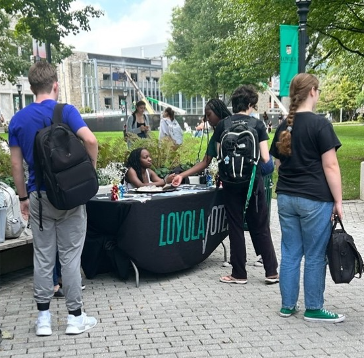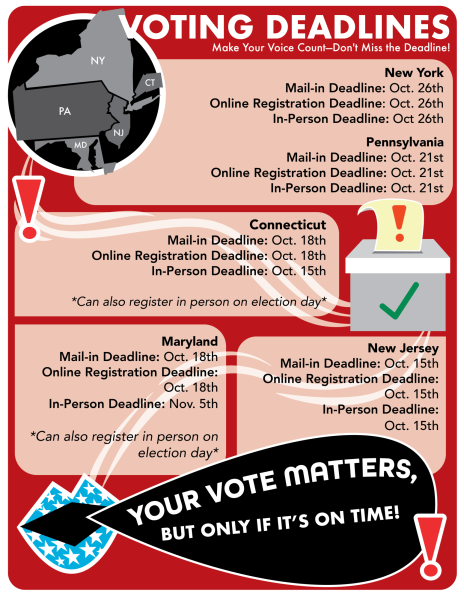According to the Brennan Center for Justice, over the last 20 years, states have put barriers in front of the ballot box imposing strict voter ID laws, cutting voting times, and restricting registration. In a 2013 decision, the Supreme Court weakened the Voting Rights Act and the consequences of that kept a significant amount of U.S. voters out of the polls.
One organization dedicated to helping make this process easier for students is LoyolaVotes. It is a non-partisan organization on campus that aims to increase civic engagement among Loyola community members such as students, faculty, staff, and administrators. It ensures members of Loyola have an easy and accessible way to register to vote by hosting tabling events around campus.

Kate Grubb Clark is a faculty co-chair of the program, along with Dr. Timothy Clark. Clark said the community formed over a shared view of the importance of voting.
“Voting is one of the primary ways in which any generation, anyone who’s registered, can share their viewpoint. When you get frustrated by something or want to change something, voting is the first step in that,” Clark said.
Clark also said that technology plays a growing role in the electoral process, offering advantages and challenges. She pointed out the convenience of online voter registration, saying it makes the process much simpler.
“I can go online, plug in my information, and confirm yes, I’m registered to vote, this is the party I would like, this is the district. All that information is so much more convenient now,” Clark said.
As for how to cast your vote, many Loyola students may choose mail-in ballots instead of in-person voting. Pennsylvania native Owen Reilly ‘28 plans on voting as an absentee because he cannot see himself having a realistic opportunity to vote in person.
“It’s important for me to vote because I live in an extremely important swing state, which frequently is a major indicator of who will be president. Every presidential election in my state usually comes down to about 20,000 votes, so it is very exciting to be a part of this crucial part of our society,” Reilly said.
Grace Gilrane ‘26, is a head officer for the College Democrats, who herself plans to vote absentee and sees the option as invaluable to college students.
“I am a South Carolina resident so I will be voting by absentee ballot this election because I most likely will not be home around the election/during the early voting period to vote in person.” Gilarane said. “Americans have the right to vote in this election, and considering the circumstances we undergo as college students, it’s good to have a way to vote as we may be far away from home.”
Others share skepticism of the process. Ethan Broccolina, 25’ the leading officer of the College Republicans and a commuter student, plans to vote in person.
“This is because I have more faith that my vote will be counted. The biggest problem that I see that could arise from absentee voting is voter fraud. Despite my reservations about the practice, I recognize that it is necessary in some cases, in particular with college students who are away from their polling places. I am no one to deny the American people’s right to vote,” Broccolina said.

If you plan on voting, the key to getting your voice heard is ensuring that you are meeting all of your state’s deadlines. For more information on your state’s deadlines, you can visit Vote.gov, and click on your state.
This is the second part in a three part series about the 2024 election season. The next part of the series are Gen Z’s thoughts about voting.












































































































